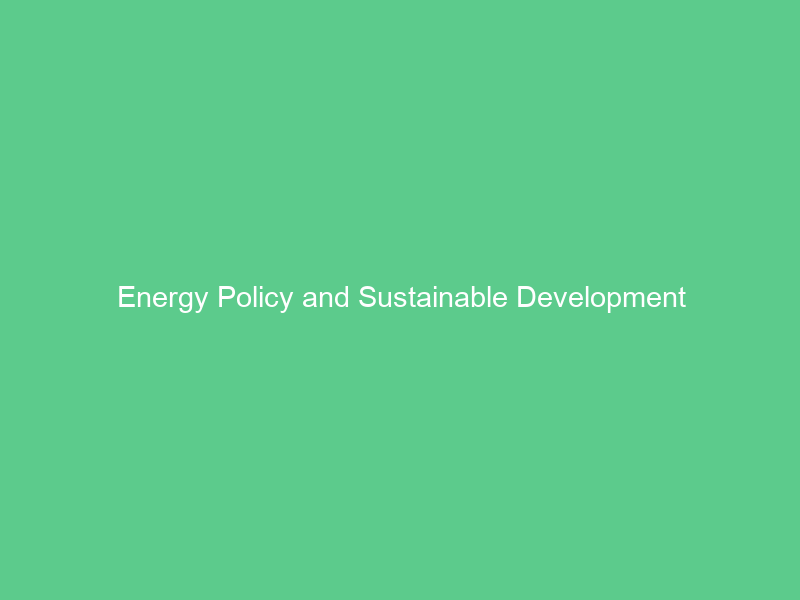Energy policy refers to the strategies and actions a country employs in managing energy-related decisions, including legislation, international treaties, investment incentives, consumption guidelines and efficiency standards, taxes/pricing strategies as well as taxes/pricing schemes.
Countries develop energy policies based on their national interests. They may prioritize system reliability, resource diversification, technology export potential or economic costs when crafting an energy policy.
Sustainable development
Sustainable development is an international goal aiming at the simultaneous attainment of economic health, environmental protection and social equity objectives. These three dimensions may also be known by other names or referred to as domains or aspects.
Energy is essential to sustainable development. It must provide affordable and environmentally-friendly modern energy supplies at reasonable costs while making maximum use of existing conventional sources. Furthermore, developing and implementing technologies which increase energy efficiency while expanding access to renewables while protecting the environment are all vital.
Although no single international agreement exists on energy, the UN Sustainable Development Goal 7 sets targets in various areas related to this subject:
Fossil fuels
Fossil fuels such as oil, natural gas and coal are nonrenewable energy sources that have taken millions of years to form. They form through anaerobic decomposition of prehistoric plant and animal remains that were buried deep underground beneath layers of sediment, creating different kinds of fossil fuels depending on the mix of organic materials used, time spent underground as well as temperature and pressure conditions at formation.
These fossil fuels are used to generate electricity and power vehicles, as well as providing raw material for the petrochemical industry, which manufactures everyday items like paints, detergents and plastics.
Though fossil fuels are essential to industrial development, when burned they emit harmful emissions that contribute to global warming and cause health problems. Drilling, mining and transporting fossil fuels produce air pollutants as do burning them to generate electricity or heat buildings and homes – these emissions also include carbon dioxide emissions which cause global warming and toxic air pollutants which cause health problems.
Clean energy
Since Chernobyl and acid rain, environmental issues have gradually altered research on policies related to energy supply and use. Nowadays, articles covering energy conservation/efficiency/renewable energies are common features in every volume (Fig 2).
As efforts to combat climate change continue globally, they will require various tools at national, state/provincial, and local levels such as building energy codes, taxes on fossil fuels, air quality standards, multilateral development banks and donors providing vital financial resources that lower barriers for private investment in clean energy technologies.
Energy Policy welcomes papers exploring these and other measures which support climate-friendly energy transitions. Some changes might not directly address climate change but still advance energy policy goals – for instance by increasing oil production or expanding electric transmission networks. Others could reduce energy consumption or diversify supply sources to improve air quality without significantly raising consumer costs. Energy Policy encourages submissions analyzing these and similar measures that support energy transitions that are climate friendly.
Energy efficiency
Energy efficiency is one of the most cost-effective strategies to curb greenhouse gas emissions and slow climate change, increase energy security and foster economic development. Energy efficiency improvements can be realized via new technology or behavioral modification – and will also lower utility bills while increasing customer satisfaction.
In the US, many utilities provide rebates for energy efficient appliances such as dishwashers and air conditioners to help offset high upfront costs and make these technologies more accessible and affordable. Rebates also help overcome market and behavioral barriers which prevent widespread adoption of such technologies.
Other policy approaches to developing an energy policy for an organization include appliance standards, building energy codes and utility performance incentives based on decoupling profits from sales volumes in order to encourage investments in efficiency. While such policies can serve as starting points in developing one, top management must ultimately take ownership and communicate it throughout the workforce.

